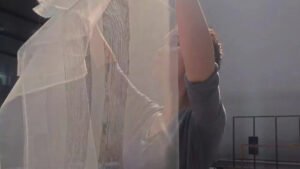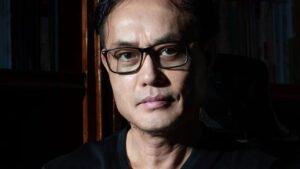
In May, I met Zhao Liang outside his studio in Beijing. Under the sunlight, his tall and slender figure cast a sharp shadow, his eyes somber and intense. Since the pandemic ended, Zhao Liang has been traveling worldwide, continuously filming material. He had just returned from Brazil at the end of April and was set to leave for Syria in June. I was fortunate enough to catch him during his brief stay in the country.
It had been three years since Zhao last accepted an interview. He didn’t hide his ambivalence about my visit—a desire to speak mixed with unease about revealing his inner thoughts. Over these years, from the pandemic to the pressing global climate issues, he has increasingly felt powerless against the absurdities of human behavior. Sometimes, he even questions whether it’s possible to change reality through creation.
He admits that perhaps the straightforwardness inherent in the northeastern temperament influences the characteristics of his work. Whether it was “Farewell, Yuanmingyuan” (2006) or “Petition” (2009), he was always at the scene of fierce confrontations, DV in hand, navigating between the system and those excluded by it, sometimes plunging in headlong, sometimes fleeing in haste. Behind it all was the sense of mission that always propelled him.
Yet what exactly rendered people powerless over the past decade? The reasons may be self-evident. Despite the shifting social context and personal perspectives, Zhao has never truly wavered. Instead, he gradually tends to contemplate the entire production system and the historical mechanisms behind events. Whether focusing on the energy industry chain behind the ghost town phenomenon of Ordos, or the past, present, and future of global nuclear disasters, his change in perspective and working methods has transformed his aesthetic presentation. His camera lens has retreated a little from the scenes of direct conflicts, yet is still firmly present, blending distinct positions into his visual language as much as possible.
He chooses to play the role of a hunter, capturing the part of reality he most empathizes with. Thus, in “Behemoth” (2015), the black and gray mines and red pits portray a stunning beauty, while the white ghost town of Ordos appears increasingly grotesque. In “I’m So Sorry” (2021), reflective narration pervades the film, and when humans gazed at their abandoned homes or when displaced farmers danced indoors, it haunted these moments like a ghost.
Therefore, absurdity has nowhere to hide. As for those alienated within it, Zhao’s lens still offers care, lingering on the miners’ wrinkled faces and callused hands, or the women’s expressions shifting from silence to sorrow—both a caress and a question.
People sometimes question whether his message is too direct, diminishing the artistic aftertaste. But perhaps unconsciously, the northeastern temperament still guides his creative core, rejecting overly ambiguous expressions. Facing such a bleak reality, Zhao Liang persistently hopes to bring you stimulation and pain. Only by physically carrying the camera and traveling the world can he affirm his beliefs.
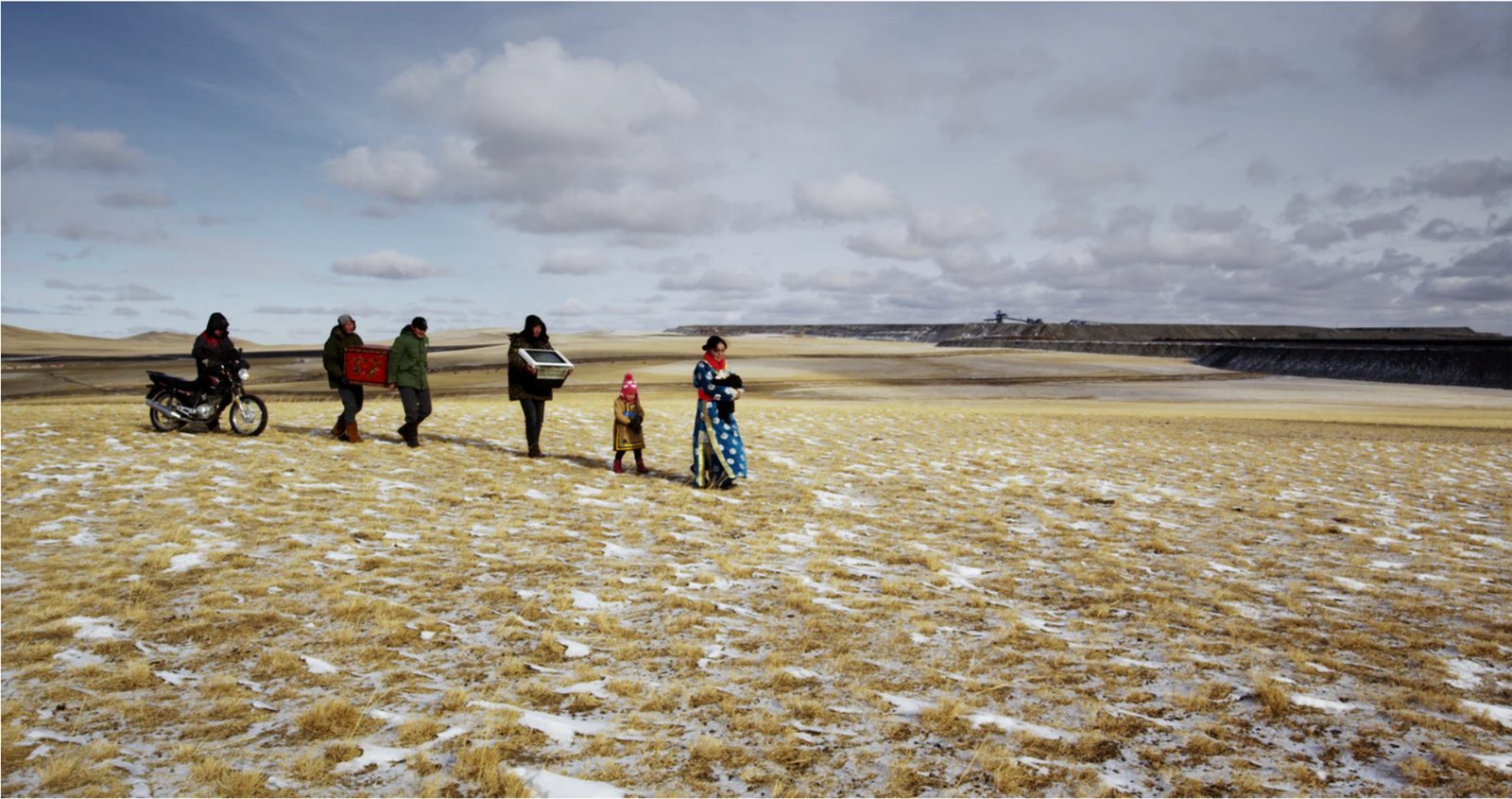
The Stimulation
You rarely talk about Northeast China in interviews, the only mention being a dialogue in 2008: “Making films is related to people’s temperament… North-easterners speak frankly, say what’s on their minds directly, without beating around the bush, and (my) works are the same.” Do you still feel that way now?
ZHAO Liang: The Northeast indeed seems to have shaped a certain temperament in my work. I’m known for being straightforward and direct. Some people believe art should have aftertastes and blanks, but I particularly hope my documentaries bring you stimulation, like a punch to the face. You could call it linguistic precision or visual impact, but it’s definitely not ambiguous.
I’ve always focused heavily on the visual state and linguistic transformation of films. Facing such a pale reality, I hope that after watching my film, it carves into your memory and stays in your heart rather than being quickly forgotten.
As a creator, is this a pursuit of an unavoidable expression?
ZHAO Liang: Whether making documentaries or video art, it’s always been about reaching a point where I feel compelled to do something, to say something, that I start researching and expressing it through images. I’ve never considered commercial issues, and the cycle of each film is very long.
There’s another trait in northeastern temperament—ignoring others and doing my own thing. But I still pursue a sense of existential meaning. I ponder whether what I’ve been doing over the decades truly holds meaning. Many artists might think the pursuit of meaning itself is meaningless and don’t realize they’re nihilists. When they think of the vast universe, with the unchanging solar system existing for tens of thousands of years, people seem to see through everything, adjusting their works like self-cultivation. But I’m not like that. I need an original sense of meaning and motivation to drive me.
No one is born omniscient and omnipotent. I’m using my way of slowly observing and understanding the world until I grasp the understanding of this part. In this process, I’m constantly learning. I also believe in conducting my work in a personal, physical way and insist on carrying the camera on my own shoulders, never using a cameraman.
The process of physically arriving at a scene is like primitive hunting. Essentially, the camera and hunting have a fundamental connection. I strive to capture as much as possible of what I want, and bring it back to create a dish according to a recipe that suits my own taste. Of course, luck is also important. Hunting is a process that requires patience and waiting.
The Absurdity
Absurdity has always been a core trait of your films. Even in your first feature-length film, “Farewell, Yuanmingyuan,” you seemed conscious of expressing absurdity.
ZHAO Liang: It’s not that I actively seek out absurdity, but society is full of various contradictions and absurdities that don’t need deliberate searching.
When I started making films in the 90s, it was more out of a sense of responsibility to record reality. The advent of DV cameras was a blessing. With a small camera, I could wander the streets without entering the film industry and engage with social reality in my own way.
I made “Farewell, Yuanmingyuan” during the forced demolition of the Yuanmingyuan artists’ village. Everyone was already living precariously at that time, and now that they were about to be evicted, there was even more panic. There’s one scene where, when I saw people coming, I grabbed my camera and ran along with the others, and someone even laughed—it was really absurd.
To be honest, those scenes were terrifying to me and not exciting at all, but I kept on filming. Later, when shooting “Petition,” I was driven by the same sense of mission, feeling that I had to record the conflict between individuals and the social reality of that era.
ARTDBL: Although “Crime and Punishment” was shot in your hometown, Dandong, the film doesn’t seem to particularly highlight Dandong’s regional uniqueness.ARTDBL:
ZHAO Liang: I think the so-called regionality is conveyed in the opening subtitles, and that was enough. Back then, violent law-enforcement behavior was not bound by law, and it was the same for any city. It was like in the past, catching vagrants or people without the three licenses in Beijing and calling it re-education through labor, detention, and repatriation. Surveillance cameras have improved things in recent years, but during the pandemic, sudden violent behaviors occurred again.
Sometimes we find ourselves in an information cocoon, unable to comprehend what’s happening for a moment. But if you observe human behavior from a higher point of view, you will realize that many things are done by people. This is the absurdity I want to express; your fury is useless.
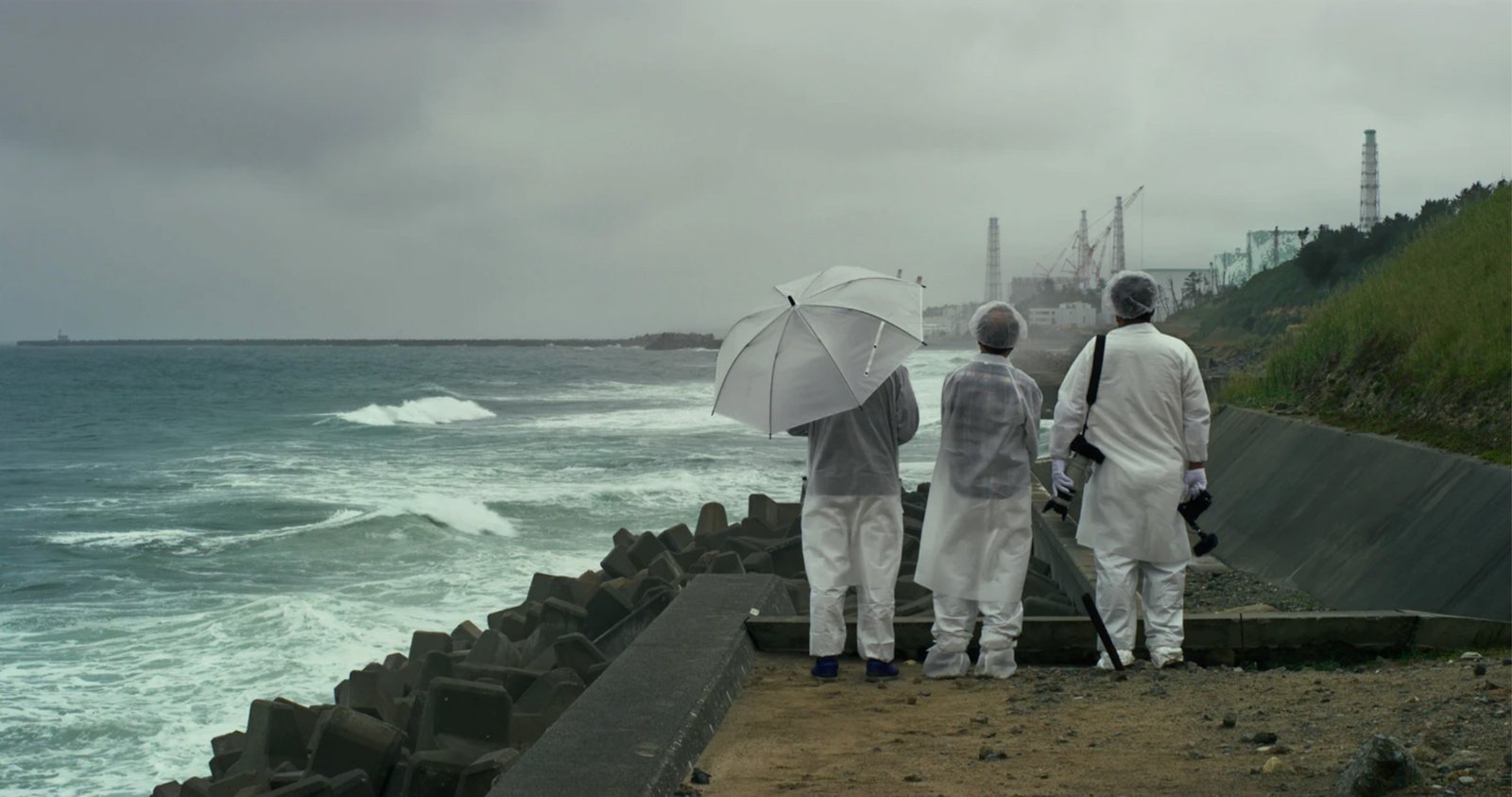
The Deception
About absurdity, there are many occasions when it coexists with the poetic aspect of your work, and they even reinforce each other.
ZHAO Liang: Many have asked why I film such hideous scenes so beautifully. They do appear beautiful on the outside, but they decay inside. I once did a photo series called “Beijing Green” during the construction of the Olympic Center. The surrounding areas were in the middle of development and all covered with green cloth, and the image was quite spectacular, even resembling the mountains and rivers of traditional Chinese landscape paintings a little. It looked aesthetically pleasing, but it was actually a modern form of irony.
In “I’m So Sorry,” the 500-meter-wide Atomic Lake is beautifully green and quite a stunning scene. But once you realize that it is the result of an atomic bomb explosion and is full of high radiation, you will be shocked. My narration in the film conveys a similar message. How exactly do we define beauty? I’ve been unconsciously presenting how this visual pleasure deceives our understanding of reality.
The absurdity that you wish to discuss seems to be more universal in “Behemoth” and “I Am So Sorry” compared to your earlier films.ARTDBL:
ZHAO Liang: The absurdity in these two films is more of the result of my manipulation. Unlike the direct conflict in “Petition” and “Crime and Punishment,” it’s embedded in longer timelines, or, so to speak, broader social phenomena. Right now, melting glaciers in Switzerland are being covered with blankets that reflects sunlight by the local authorities to slow down their process. It allows the glacier to stay for a few more years. At the same time, it is also a commercial project that builds caves inside these glaciers and allows tourists to visit. These are all examples of contradictions in human behavior.
Last year, I revisited the filming sites of “Behemoth” in Inner Mongolia, and I found out that place was investing in all sorts of environmental restoration projects, like planting trees to slow down the spread of desertification, and achieving carbon neutrality. But previous mining and exploitation had ruined the land, making it impossible to restore the original surface. Destruction is easy; reconstruction is hard.
If we look further into the past, similar absurdities have occurred in every period of human history. In the 70s, the US demolished many public housing projects. More recently, the news has shown that Hainan is also demolishing new buildings. All of these actions were initially driven by profit but lacked long-term planning, and in the face of systemic collapse, valuable things eventually became worthless. If a new investment is restarted, who will be the new beneficiaries?
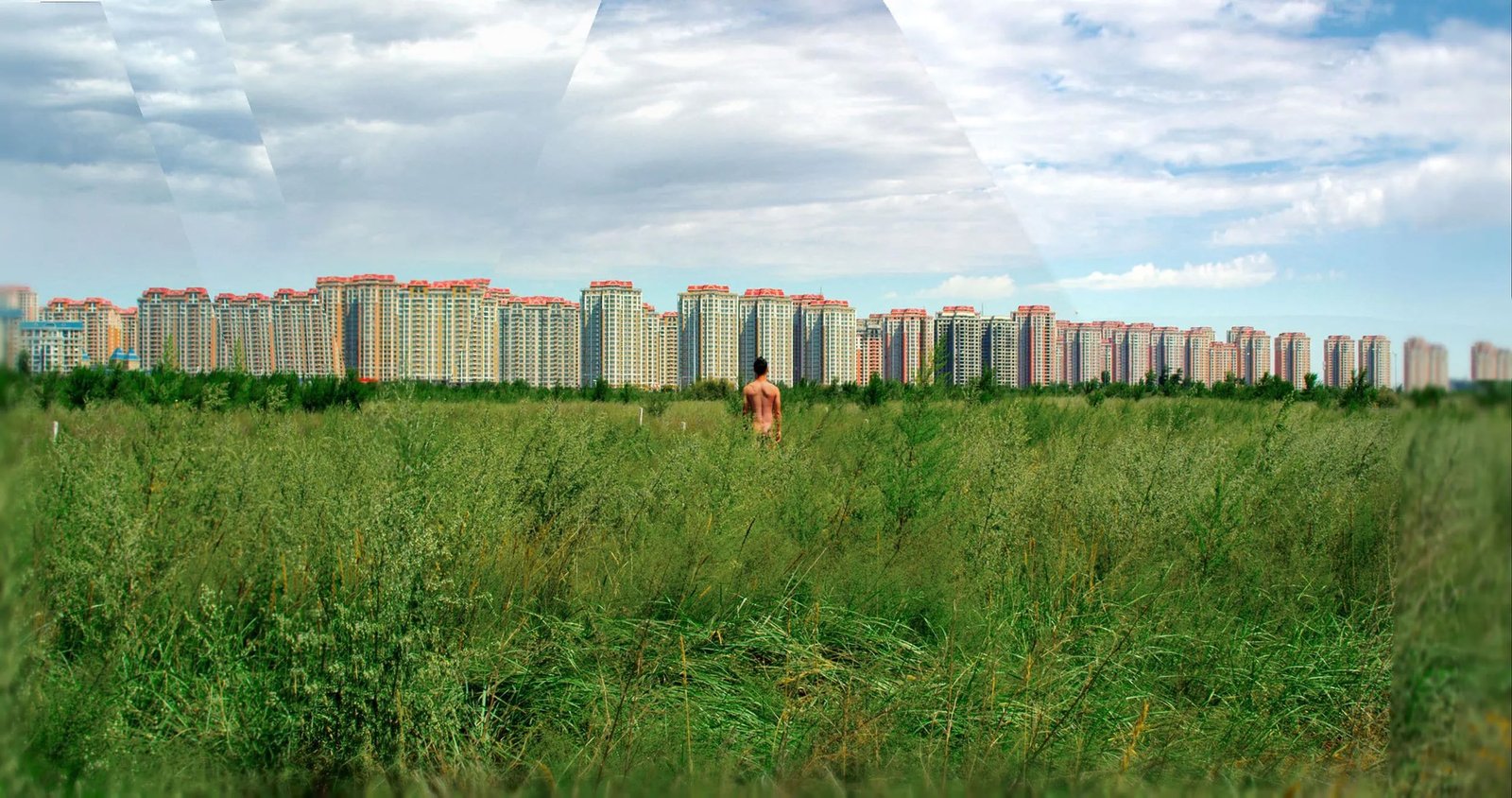
The Transition
What led you from traditional documentary filming to exploring visual language?
ZHAO Liang: My so-called language transition benefited from my video art experiences. Initially, I did a lot of work in this field, but only in 1997 did I learn the term “video art.” I previously thought I was just making short films. Then I began putting more effort into documentaries and only occasionally made these videos. After “Petition,” I gradually moved away from the traditional follow-up filming and towards a more sensory, impactful approach by making an additional conversion. This is a deep research process as well as a self-completion process for myself.
Though past beliefs and idealism are collapsing and diminishing, exploring visual language makes me feel like I can still keep filming. This brings me back to the essence of art. Ultimately, I believed that I had to form my own language so that my expression can grow clearer.
Your way of filming people seems to be becoming more introspective.
ZHAO Liang: The old filming method required a lot of manpower, material, and emotions. I would step into each subject’s life and spend years with them, it’s almost as if we were dating. But now that I’m older, I feel embarrassed about filming people that way. When I was young, I could do it in any way I preferred, but now, with my hair all gray, going up to people and invading their privacy with a camera in their face feels quite offensive.
I’ve gradually developed a sense of distance, avoiding intervening in someone’s private life and instead focusing on how their behavior fits into the concept of my film, capturing the side I want to see. Of course, this involves the old debate about truth: that there’s no absolute truth, only the one the author presents to you.
Do you worry that your subjective expressions today face much ambiguity and misinterpretation?
ZHAO Liang: Some are indeed confused by my transformation. Being in an industry for so long naturally forms a professional trajectory. This is a slick era, and people have adapted to the faster, trendier methods brought by capital, creating a sense of impatience. I, for one, still particularly respect that elegant creative state.
But I still try to walk a more neutral path. I am not fond of the term experimental film, and I don’t want my films to be too plain. I hope they are a mine with countless layers to be explored, allowing people to perceive different levels based on their knowledge and aesthetics.
I’ll continue to make documentaries in my own way. I’ve always lingered on the fringes, never stepping into the core of any circle of interest. This is not a complaint; it’s just that, seeing how the times are, many have chosen a marginal method of survival.
The Call
The relationship between humans and the environment has been a core expression in your recent films. Did you realize that the destiny of human and the environment are integrated since “Behemoth”?
ZHAO Liang: The relationship between humans, land, and nature is inseparable, like an unavoidable romance. Growing up in a forest zone, big cities don’t excite me, but I feel deep affection for nature’s richness and beauty. This isn’t taught by education or politics but is merely an instinct. Recently, while filming in Brazil, villagers took me into the forest and showed me plants and spices as if they were some priceless treasure. That is a form of natural communication that I deeply admire.
I do emphasize the relationship between humans and land like you said, and I align with the view in “Capital in the Anthropocene,” which states that “both workers and the Earth are being exploited.” But these workers are not only being consumed but also self-consuming. You see the miners leading harsh lives in poor environments, yet they’re using their own hands to destroy nature. I want to observe the behaviors of humanity from an outsider’s perspective, and the tragedy here is what I want to critique.
Fukushima farmers used to do a spring dance in the fields to welcome the spring plowing season. In “I’m So Sorry,” these farmers were displaced by the nuclear accident and forced to move into a new community. They continued their traditional culture of spring dancing in a public indoor space. But dancing barefoot on the floor is of course different from dancing in the field with soil under your feet, so I added a reflective narration. I believe this allows people to resonate.
As a medium, what can film express and amplify about environmental issues that concern you?
ZHAO Liang: Spreading awareness through film is a goal itself. Like the Argentine artist Tomás Saraceno, who implemented an action project addressing ecological issues, if more people were to receive this message, his ideas still needed to be recorded and broadcast through films; the essence is the same. You do something that costs resources, manpower, and material, ideally you’d want to have broader impacts and translate it into something meaningful.
For instance, this year’s Venice Biennale featured Brazilian curators and many indigenous artists, but the essence of these works is not to express art. Instead, they are using art as a disguise to call out to the world and reflect on the modern conflicts brought by capitalism. So, what is art? Shouldn’t it be art’s mission to be used to convey positive influences on the present or the future?
Do you hope to convey your own ideology in your films?
ZHAO Liang: I certainly hope to establish my own ideology, but my ideas are still contradictory and immature. So now I want to see the world and hear from those truly living on the land. What do they have to say?
Capitalism has become a powerful concept, bringing benefits like democracy, equality, and free competition, but also exploiting global Southern labor resources. It has built its own civilization, turning the world into its base for production and consumption. We often hear people say that China is developing too rapidly, and perhaps we shouldn’t be so hasty. Instead, we should slow down and, as the saying goes, wait for our souls to catch up. But when development actually slows down, it seems like our lives are not cared for. Existing ideologies are hard to shake because that would challenge vested interests. But there should be a new ideology emerging, reconnecting humans to the relations of the earth, and inventing sustainable human development models.
What are your filming plans and challenges in conducting global research now?
ZHAO Liang: I have an ongoing seven-year filming plan, but it’s a very challenging one. The main basis of the plan focuses on global climate issues and systemic exploitation by global capitalism. Here I’ll break it down into a few sections, one of them on the living conditions of indigenous peoples around the globe, one on agricultural production, including meat, cotton, palm oil, etc., and finally industry, such as how rare metals we now use in our daily lives, like lithium batteries, are affecting people in other parts of the world.
Filming abroad isn’t as easy as filming in China. You have to know the language and culture and search for local producers, and luck is essential. It’s also hard to stay in one place for very long, so I had to complete it in as short a time as possible. Eventually, this becomes an act of involution and self-exploitation, as I struggle to do more work myself for as little money as possible.
The Tug
How have you balanced pessimistic reality and active action over the years?
ZHAO Liang: I do feel lost sometimes. Society is changing, and people’s sense of value is very much divided. The former sense of happiness of doing something without any doubt, including the critical colors and tones in those films, has dissolved in today’s social atmosphere.
Especially now, as I have traveled around the globe, seeing the complexity of the world and the absurdities people are experiencing in different regions, the idealism of wanting to change something gradually feels powerless. Did this come from our education? We were taught to chant peace slogans as children, yet in reality, conflicts of interest never really ceased…
But I’ve never wavered in my stance. I am just no longer as certain that I can change the world through my work. The obsession with wanting to change something is still there, but what I can change still depends. At least this belief can support me to move further down the road.
In that case, does filming mean taking action for you?
ZHAO Liang: I wouldn’t dare call what I’m doing an action, but I do focus on activists, ensuring that their voices can be heard. I can’t be an actual actionist, calling out desperately on-site, but I believe the spread of work might be more crucial. I’m also an environmentalist, ensuring all my exhibition materials are recyclable, as the pollution made by artists’ is equally severe.
But I make the films for myself. I’m very subjective and have to do this with a very strong personal purpose. The most gratifying thing about making documentaries is that I can create connections. Each place I visited forms a bond, and when I go back there again, we’ve become old friends, and I can delve deeper into that land for the things I desire.
How do you feel looking back at your early documentaries now?
ZHAO Liang: All experiences are good. If I could film “Petition” now, I’d do it a lot better, but it completed a sense of self-establishment for me back then. My past experiences have shaped me, tugging me around reality and making me unable to film anything too profound or utopian. I believe that reality themes are still essential, and caring about reality will always be the essence of documentaries. In China’s context, independent documentaries are independent of the regime and propaganda, but I think true independence is to critically address the times. This era needs direct expression.

